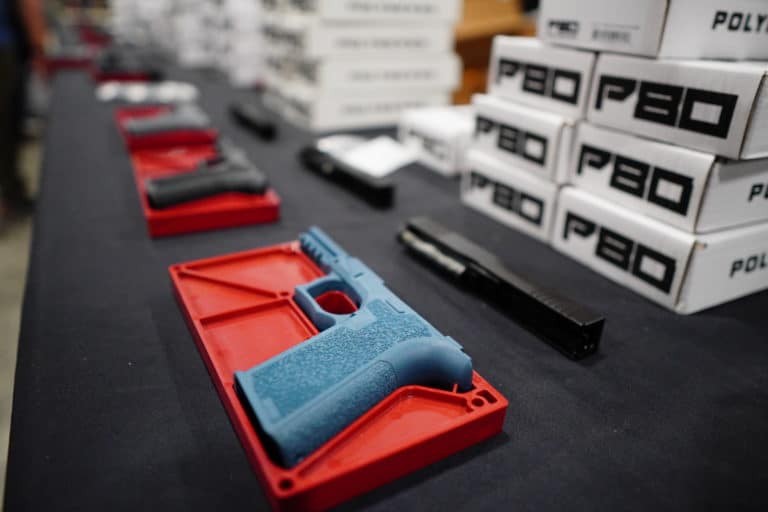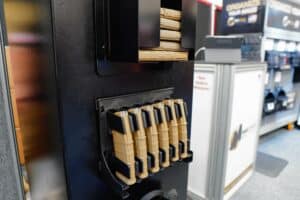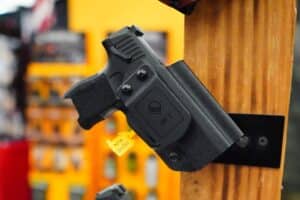Blue cities and gun-control advocates have had remarkable success in going after the nation’s most high-profile seller of homemade gun kits in court of late.
Most recently, Baltimore announced that Nevada-based unfinished firearm parts manufacturer Polymer80 had agreed to pay $1.2 million in a suit accusing the company of fueling gun violence in the city with its business practices. The settlement will not only permanently bar Polymer80 from marketing or selling any of its products to Maryland residents, but it will also require the company to provide Baltimore city officials with quarterly reports disclosing all of its sales to customers in the surrounding states like Pennsylvania, Delaware, Virginia, and West Virginia.
The city touted the settlement as “the most expansive and strictest” injunction secured against Polymer80 in the country, but it is certainly not the only one. Washington D.C. secured a $4 million judgment from the company in August 2022 after a judge found that it was “falsely and misleadingly” advertising that its products were legal in the District. That was followed by a $5 million settlement with Los Angeles last May that prohibits Polymer80 from selling its homemade gun kits in the state of California unless it first serializes them and conducts a background check.
All told, the homemade gun kit maker has now racked up more than $10 million in legal penalties in less than two years and has been barred from advertising and selling its products in three major US markets.
The trio of settlements marks a rare bright spot for gun-control advocates in their otherwise largely unsuccessful quest to use lawsuits to hold gun companies accountable for third-party criminal violence. What makes them more noteworthy is that many of the legal claims involved are similar to those often used to go after traditional firearm makers and sellers.
Up to this point, most lawsuits brought against traditional gun businesses by city politicians and gun-control groups have based their claims on the idea that they create a “public nuisance” through gun violence committed with the use of their products. Other common claims include the idea that a particular brand or firearm model’s advertising is designed to appeal to minors or criminals.
Aside from a landmark settlement secured by the families of Sandy Hook victims with bankrupt Remington’s insurers in 2022, those claims have borne little fruit. The federal Protection of Lawful Commerce in Arms Act (PLCAA), which generally precludes lawsuits against gun companies for crimes committed with their lawfully sold products, has tended to win out.
Unlike the previous attempts against traditional firearm businesses, however, those claims were enough to get Polymer80 to the negotiation table. For instance, the Los Angeles suit claimed Polymer80 fueled a “public nuisance” and engaged in “deceptive business practices through misleading advertising” about the legality of its products under California law.
“By marketing, selling and distributing ghost gun kits to California residents without serial numbers, without conducting background checks, and without appropriate safety features, Polymer80 has created a public nuisance, resulting in a significant threat to the public right of health and safety in public spaces,” the original complaint stated.
The Washington D.C. and Baltimore suits featured much of the same. Each jurisdiction has its own laws against possessing and selling unserialized firearms, and both were able to tie Polymer80’s business of selling the individual components used to assemble those firearms to individuals skirting those laws. That was enough to make Polymer80 feel the need to settle rather than fight it out in court.
That could prompt other cities with similar laws targeting unserialized “ghost guns” to get in on the action. If that happens, things could start to look like the pre-PLCAA days, where sue, settle, and repeat was the modus operandi for going after gun companies.
Success inevitably invites copycats. A fourth major city, Philadelphia, is already looking to secure the next major settlement against Polymer80 in a lawsuit filed against the company last summer in partnership with the gun-control group Giffords.
It’s unlikely to be the last.
Gun-control activists and big city politicians have seized on the opportunity. While they haven’t had much luck in piercing the PLCAA to go after traditional firearm sellers, the repeated settlements with Polymer80 present a more viable path for them to use lawsuits to do damage to the broader market for home-built firearms.






